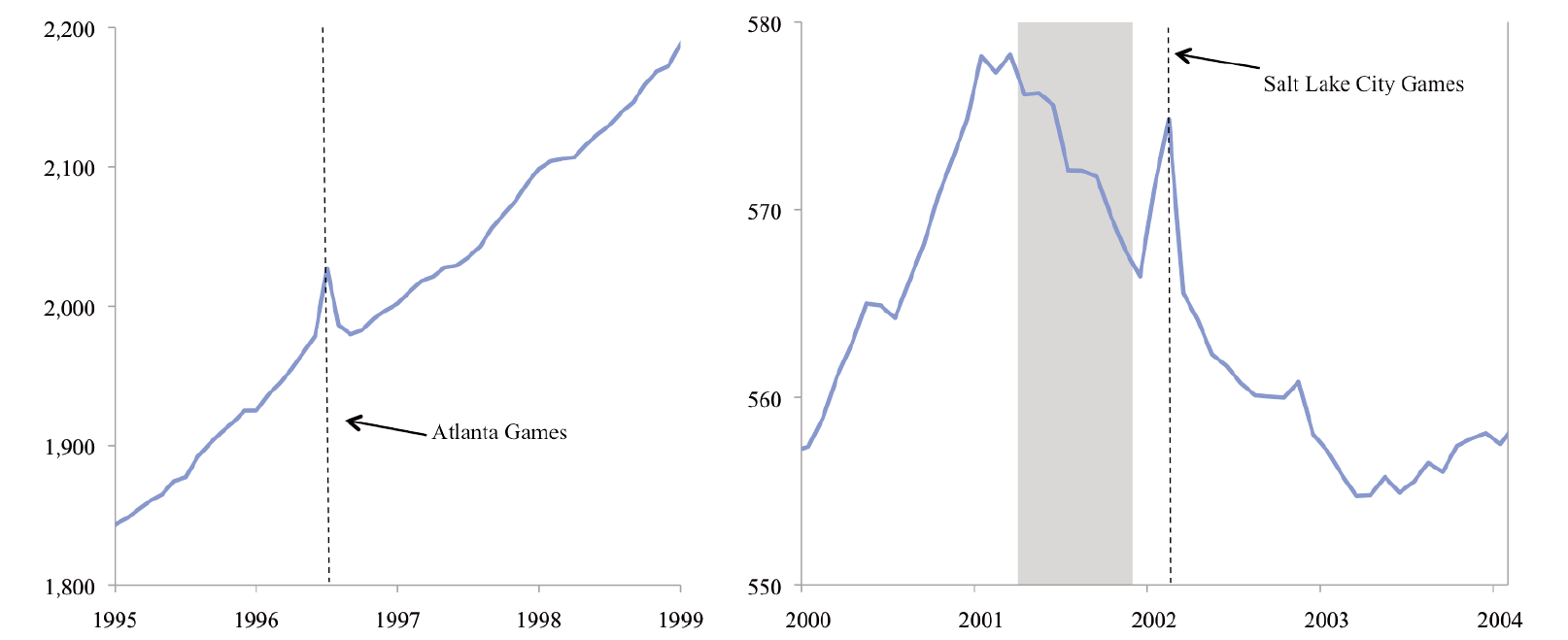The Legacy of the Olympics: Economic Burden or Boon?
—David Cameron, Prime Minister of the United Kingdom
The Olympic Games are considered the foremost athletic competition in the world. The modern games have reached a scale that their ancient Greek founders could scarcely dream of. More than 10,000 athletes and 5,000 coaches and team officials, collectively representing nearly every country in the world, will convene in London for the 2012 Summer Games. Hosting over half a million spectators each day for 16 straight days requires nearly a decade of preparation and an extensive investment by the host nation and city.
Despite these demanding obligations of time and money, no fewer than seven cities have bid to host each of the past four Summer Olympics; in fact, the 2008 games had 11 bidding cities. Clearly, there are economic benefits associated with the games that these accommodating hosts deem more valuable than the expected costs.1
When considering the economic costs and benefits of hosting the Olympics it is important to differentiate between explicit and implicit costs and benefits.
- Examples of explicit costs include direct spending on the construction of the Olympic facilities.
- Implicit costs stem from the opportunity cost of the explicit costs; the opportunity cost of the funds spent to host the Olympics is the benefit the host city and country would have received from the best alternative use of the funds.
- Explicit benefits are the direct revenue gained from ticket sales, advertising rights, tourism, as well as new jobs in the local economy.
- Implicit benefits are less tangible and include increased civic pride in the host city and higher international esteem.
Explicit and Implicit Costs
Costs associated with hosting the Olympics begin with the bidding process. Interested cities spend up to $100 million to "woo" the delegates of the International Olympic Committee (IOC) to vote for their city. During the bidding process, cities estimate their perceived economic costs to host the games. These estimates are often understated because of the competitive nature of the bidding process.2
Once the winner of the bidding process has been chosen, the host city has almost a decade to prepare for the Olympics. During this time the city must expend resources to construct the sports venues and the Olympic Village and to make improvements to infrastructure (roads, public transportation, and telecommunications networks). These investments require the government to increase taxes and/or divert existing resources from other projects, so there are clearly opportunity costs.
Early in the modern history of the Olympic Games, host countries routinely used public funds for the entire cost of the games. This model of funding proved unsustainable and ended in 1976 with the Montreal Summer Games.3
Breaking from the Montreal model, the 1984 Los Angeles organizing committee sought to repurpose existing facilities and attract corporate sponsorship. This marked the beginning of the commercialization of the Olympics and shifted some of the financing burden to private sources. The 1984 Summer Games were a fiscal success; the games yielded explicit benefits of $335 million. This renewed global interest and dramatically increased the number of bids for following games. Despite the new financing model, few of the later hosts accrued the same level of explicit benefits.4
The opportunity cost associated with the explicit costs is an important factor in the cost-benefit analysis of hosting the Olympics. For example, instead of hosting the Olympics, a nation could fund public works projects, launch new or improve existing social programs, or save the funds. The best alternative use of industrial services and land use should also be considered as an opportunity cost. The large-scale construction projects associated with hosting the games increase business activity in the local construction industry. However, these projects crowd out5 other construction projects that would have been undertaken if not for the increased demand in preparation for the games.6
Additionally, many host cities are large urban centers with scarce land to accommodate the needs of the Olympic complex. Building the facilities could put upward pressure on land values and raise the price of housing for the community.
Explicit and Implicit Benefits
Hosting the Olympics has several economic benefits for the host city. The host city earns the explicit benefits of revenue from ticket sales, broadcast privileges, and increased tourist spending. This source of revenue is diminished to a certain degree because almost half of this revenue is retained by the international federations, the national Olympic committees, and the IOC itself.
In addition, while total tourist spending will certainly increase because of the games, some of this spending is not truly additional spending. For example, some travelers will choose to avoid visiting London during the 2012 Games because of the expected increased congestion in the city.
Host cities stand to gain appreciably from legacy effects, or economic benefits that accrue over time. The Olympics require well-developed infrastructure, which is more challenging for host cities in developing countries. These extensive infrastructure projects could take longer or possibly never come to pass without some sort of urgent impetus—in this case, the Olympic Games. For years following the games the infrastructure improvements (if used by businesses and the community) could provide productivity gains for the local economy, as well as improve the quality of life.
Olympics-Related Temporary Increase in Employment

NOTE: Hosting the Olympic Games creates extra demand in the labor force of the hosting city. However, the job growth is not sustained and the job gains quickly disappear in following years. The shaded region with the Salt Lake City snapshot indicates the 2001 recession as defined by the National Bureau of Economic Research Business Cycle Dating Committee.
SOURCES: Bureau of Labor Statistics from FRED (Federal Reserve Economic Data) with ATLA013NA (left) and SALT649NA (right).
The construction of the sports facilities requires careful forward planning to avoid creating costly facilities that will later sit vacant or have limited use. Without establishing demand for their future use, the hefty explicit costs associated with maintaining these structures will fall to the public. For example, in Sydney, Australia, it now costs $30 million per year to operate the 90,000-seat stadium constructed for the 2000 Summer Olympics. Athens, Greece, serves as a shocking example of failed legacy planning; the majority of facilities used in the 2004 Games are in a state of ruin.
In contrast to the post-Olympic experience in Sydney and Athens, several institutions of higher learning in Atlanta have acquired Olympic facilities, including parts of the 1996 Olympic Village now used for student dormitories, and the Olympic aquatics facility. Additionally, the main Olympic Stadium has been repurposed as a baseball park for the Atlanta Braves. The Olympic facilities can also revitalize urban blight by increasing real estate activity in their immediate area. This is precisely the intention behind the location of the Olympic complex of the 2012 Games in the run-down industrial district in East London.
Hosting the Olympics sends a signal to the world that raises the stature of both the host city and nation on the global stage. The implicit benefit of positive publicity received from the games is expected to increase tourism and attract businesses. Andrew Rose and Mark Spiegel of the Federal Reserve Bank of San Francisco suggest that hosting the Olympic Games sends a signal of trade liberalization to the world and results in greater trade activity in the long run. Within the city itself, hosting the games requires the combined efforts of countless local volunteers, which engenders a sense of civic pride among the populace. These implicit benefits are difficult to measure but are important factors in the decision to host the games.
Conclusion
Hosting the Olympic Games is no easy task. It requires substantial investment on the part of the host city and nation. To determine whether it is a wise investment, policymakers must carefully (and honestly) measure the economic costs that they will incur as well as the economic benefits expected. Since the host city must share revenue gained from the games, it should not expect large immediate explicit benefits. A net economic profit is contingent on whether the host city can maximize the economic benefits it receives from legacy effects through adept forward planning. In doing so, it will reap rewards long after the closing ceremony.
Crowding out: The situation in which increases in government spending lead to reductions in private spending.
Explicit cost: A cost that involves actually laying out money.
Implicit cost: A cost that does not require an outlay of money; it is measured by the value, in dollar terms, of foregone benefits.
Legacy benefits: Benefits that accrue over time.
Notes
- The cost-benefit analysis that follows is not exclusive to hosting the Olympic Games and is also applicable to other mega-events such as the Super Bowl or World Cup.
- Candidate cities often match the promised amenities of the other bidders while understating their costs to make their bid more attractive to IOC members. This practice can lead to the phenomenon known as the winner's curse, whereby the host city will make itself worse off by submitting a winning bid that exceeds the value of hosting the Olympics.
- The original projected cost of $124 million was $2.68 billion short! This burden fell entirely on the taxpayers and it was not until 2005 that the sum was paid off through a tax on tobacco. After this incident, no country wanted to bid for the Summer Olympics because of the perceived risk of financial ruin. Los Angeles was the only city to bid for the 1984 Summer Games and it did so with the condition that it would not incur any financial obligation.
- For example, the Spanish government was short $6.1 billion from the 1992 Barcelona Summer Olympics, while Atlanta (1996) and Sydney (2000) reported breaking even. Beijing spent around $42 billion for their 2008 Summer Olympics, and it is unlikely that there will be a net profit.
- Crowding out occurs when increases in government spending lead to decreases in private spending.
- A supply and demand chart is the best way to visualize crowding out. The Olympic construction projects will cause an outward shift of the demand curve, but the supply curve (representing the capacity of the local construction industry) will remain stationary. Thus, prices for construction services will increase and some other projects will be put on hold in response.
References
Barton, L. The Economic Impact of the Olympic Games, in Pricewaterhouse Coopers, European Economic Outlook. Chap. 3. June 2004, pp. 18-25.
Blitz, Roger. London Wrestles with Legacy Issues. Financial Times, May 3, 2012.
Burton, Rick and O'Reilly, Norm. "Consider Intangibles When Weighing Olympic Host City Benefits." Sports Business Journal, September 7, 2009, 12(13), p. 33.
Kortekaas, Vanessa. "Avoid London Ahead of Olympics, TfL Says." Financial Times, June 12, 2012.
Preuss, Holger. The Economics of Staging the Olympics: A Comparison of the Games 1972-2008. Cheltenham, UK: Edward Elgar Publishing, 2004.
Rose, Andrew K. and Spiegel, Mark M. The Olympic Effect (PDF). Working Paper No. 2009-06, Federal Reserve Bank of San Francisco, March 27, 2009.
Smith, Helena. Athens 2004 Olympics: What Happened After the Athletes Went Home? The Guardian, May 9, 2012, p. 21.
Zimbalist, Andrew. "Economic Impact of Olympic Games Rarely Adds Up to Much Gold." Sports Business Journal, August 1, 2005.
Zimbalist, Andrew. "Is It Worth It? (PDF)" Finance and Development, March 2010, 47(1), pp. 8-11.
Citation
Lowell R. Ricketts, ldquoThe Legacy of the Olympics: Economic Burden or Boon?,rdquo Federal Reserve Bank of St. Louis Page One Economics, Aug. 1, 2012.
These essays from our education specialists cover economic and personal finance basics. Special versions are available for classroom use. Views expressed are not necessarily those of the St. Louis Fed or Federal Reserve System.
Email Us


